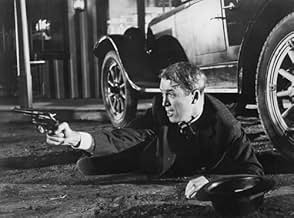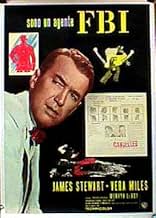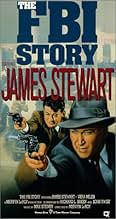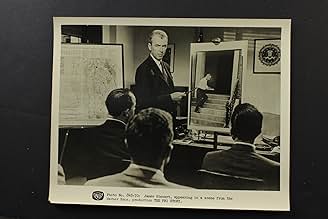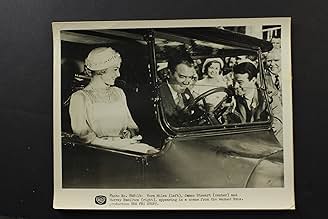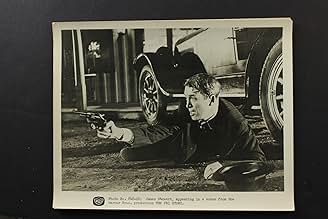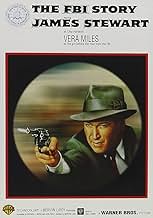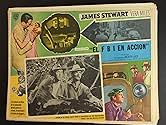NOTE IMDb
6,5/10
4,1 k
MA NOTE
Ajouter une intrigue dans votre langueA dedicated FBI agent recalls the agency's battles against the Klan, organized crime and Communist spies.A dedicated FBI agent recalls the agency's battles against the Klan, organized crime and Communist spies.A dedicated FBI agent recalls the agency's battles against the Klan, organized crime and Communist spies.
- Réalisation
- Scénario
- Casting principal
- Récompenses
- 1 nomination au total
Ken Mayer
- Casket Salesman
- (as Kenneth Mayer)
Victor Adamson
- Train Passenger
- (non crédité)
Luana Anders
- Mrs. Graham
- (non crédité)
Avis à la une
Entertaining docudrama about the history of the FBI, as told by one agent in particular named Chip (James Stewart). Yes, it's more fiction than fact but it's also a good movie. Judging by some of the reviews here, most of the people hating on the movie seem to be political ax grinders. Obviously J. Edgar Hoover had a hands-on part in the making of this film. He inspires Jimmy to stick with the FBI in an amusingly corny scene. But I'm judging the movie on an entertainment basis, first and foremost, and this movie is entertaining.
The FBI parts are great. The parts dealing with Jimmy's domestic life not so much. Vera Miles is very attractive as a blonde and plays the clichéd but likable wife role well. It's just this part of the movie isn't that interesting and takes up too much time in a movie that goes on for over two hours. Murray Hamilton is good as Jimmy's partner ("I never want to cool off! NEVER!"). If your blood boils about J. Edgar Hoover or you demand absolute historical accuracy from any film depicting real people and events, you'll hate this. But if you like Jimmy Stewart, you'll certainly find things to enjoy here. He's really the whole show. Whether he's taking on the KKK, gangsters, and Commies or just getting ticked off at his kids, he's fun to watch. It's a little long but never boring.
The FBI parts are great. The parts dealing with Jimmy's domestic life not so much. Vera Miles is very attractive as a blonde and plays the clichéd but likable wife role well. It's just this part of the movie isn't that interesting and takes up too much time in a movie that goes on for over two hours. Murray Hamilton is good as Jimmy's partner ("I never want to cool off! NEVER!"). If your blood boils about J. Edgar Hoover or you demand absolute historical accuracy from any film depicting real people and events, you'll hate this. But if you like Jimmy Stewart, you'll certainly find things to enjoy here. He's really the whole show. Whether he's taking on the KKK, gangsters, and Commies or just getting ticked off at his kids, he's fun to watch. It's a little long but never boring.
... and this little obscure piece of cinema history takes a book written about the FBI and turns it into two well told interwoven stories. One is the story of the life of one of the first FBI agents, the fictional John Hardesty (James Stewart) and his personal life through about 35 years as he marries and raises a family. The other is the story of the FBI from its infancy, told through the eyes and narration of Hardesty himself, covering several cases through the years including the Klan in the 20s, gangsters in the 30s, wartime espionage in the 40s, and then Communist espionage in the 50s. Vera Miles plays Hardesty's wife who does have her limits as the family is moved all over the country as Hardesty's assignments change.
One of the most interesting scenes to me is inside the Washington Bureau where dozens of women are in a big windowless concrete room filing stacks of correspondence by hand. That had to be mind numbing work.
I was surprised when I discovered the director was Mervyn LeRoy, because, although he directed some good ones over the years, he had a couple of bad habits. One was taking every single adapted play he directed and making it look like a play. In 1932 he actually changed scenes in one such film by having a curtain fall and then rise on another scene. The other bad habit was taking adapted books and have them play out like somebody is reading you the book - books on tape on film so to speak. This film, however, was done very well. But then I learned he and J. Edgar Hoover were friends, so maybe he had an extra incentive to have this one turn out well.
Agent Hardesty was certainly at the center of some big operations. The great irony of that being that J. Edgar was such a jealous guy that Hardesty would have spent a large part of his career in exile if he had been a real person with such a record of success. But then we would have no movie. So I found the secret to enjoying this film is to just forget about some of the actual truth that this film whitewashes over and enjoy it as an action/crime film of the time.
It can get a bit heavy handed and corny at times, but it holds up well due to the bigger than life talent of every man James Stewart.
One of the most interesting scenes to me is inside the Washington Bureau where dozens of women are in a big windowless concrete room filing stacks of correspondence by hand. That had to be mind numbing work.
I was surprised when I discovered the director was Mervyn LeRoy, because, although he directed some good ones over the years, he had a couple of bad habits. One was taking every single adapted play he directed and making it look like a play. In 1932 he actually changed scenes in one such film by having a curtain fall and then rise on another scene. The other bad habit was taking adapted books and have them play out like somebody is reading you the book - books on tape on film so to speak. This film, however, was done very well. But then I learned he and J. Edgar Hoover were friends, so maybe he had an extra incentive to have this one turn out well.
Agent Hardesty was certainly at the center of some big operations. The great irony of that being that J. Edgar was such a jealous guy that Hardesty would have spent a large part of his career in exile if he had been a real person with such a record of success. But then we would have no movie. So I found the secret to enjoying this film is to just forget about some of the actual truth that this film whitewashes over and enjoy it as an action/crime film of the time.
It can get a bit heavy handed and corny at times, but it holds up well due to the bigger than life talent of every man James Stewart.
This is an entertaining "history" of the FBI, but it should be viewed as fiction, because that's exactly what it is. What else could it be when J. Edgar Hoover personally approved and had a cameo role in the production. James Stewart is excellent, as usual, and the supporting cast, except for the talentless Vera Miles, is good. Murray Hamilton is especially good in a supporting role as Stewart's partner and best friend. The FBI accomplishments that the film highlights are undoubtedly all true. What is significant is what it leaves out.
One of the most shameful parts of the film is the depiction of the killing of John Dillinger. It is portrayed pretty much as it happened, but no mention at all is made of Melvin Purvis, the Chicago Bureau Chief who headed the operation. Instead, the operation is depicted as if the fictional Chip Hardesty were running it. It has been said that Hoover was jealous of the publicity that Purvis received after Dillinger was killed; Purvis was subsequently transferred to a remote outpost, and shortly afterward left the FBI. This is no doubt why Purvis was never mentioned in the film. But this viewer, at least, paused to think that if Purvis was treated this way, what about all the agents who conducted all the other operations depicted in the film. Were they also completely ignored and replaced by the fictional Hardesty.
The film is probably accurate in its portrayal of FBI activity up through the end of WWII. However, after that point, the film would have us believe that the only threat facing the US came from international communism, which is no doubt what Hoover believed. Never mind the Mafia. Never mind the lynchings that were still going on in the South. Never mind that blacks were being intimidated to keep them from voting in much of the South. I don't know if the FBI had started wiretapping Martin Luther King by the time this film was made, but if not, it wasn't very long afterward that it started.
As I said at the outset, this is pretty good entertainment, but it should be viewed as the sanitized fictionalization that it is.
One of the most shameful parts of the film is the depiction of the killing of John Dillinger. It is portrayed pretty much as it happened, but no mention at all is made of Melvin Purvis, the Chicago Bureau Chief who headed the operation. Instead, the operation is depicted as if the fictional Chip Hardesty were running it. It has been said that Hoover was jealous of the publicity that Purvis received after Dillinger was killed; Purvis was subsequently transferred to a remote outpost, and shortly afterward left the FBI. This is no doubt why Purvis was never mentioned in the film. But this viewer, at least, paused to think that if Purvis was treated this way, what about all the agents who conducted all the other operations depicted in the film. Were they also completely ignored and replaced by the fictional Hardesty.
The film is probably accurate in its portrayal of FBI activity up through the end of WWII. However, after that point, the film would have us believe that the only threat facing the US came from international communism, which is no doubt what Hoover believed. Never mind the Mafia. Never mind the lynchings that were still going on in the South. Never mind that blacks were being intimidated to keep them from voting in much of the South. I don't know if the FBI had started wiretapping Martin Luther King by the time this film was made, but if not, it wasn't very long afterward that it started.
As I said at the outset, this is pretty good entertainment, but it should be viewed as the sanitized fictionalization that it is.
In the tradition of G-Men, The House On 92nd Street, The Street With No Name, now comes The FBI Story one of those carefully supervised films that showed the Federal Bureau of Investigation in the best possible light. While it's 48 year director J. Edgar Hoover was alive, it would be showed in no other kind of light.
The book by Don Whitehead that this film is based on is a straight forward history of the bureau from it's founding in 1907 until roughly the time the film The FBI Story came out. It's important sometimes to remember there WAS an FBI before J. Edgar Hoover headed it. Some of that time is covered in the film as well.
But Warner Brothers was not making a documentary so to give the FBI flesh and blood the fictional character of John 'Chip' Hardesty was created. Hardesty as played by James Stewart is a career FBI man who graduated law school and rather than go in practice took a job with the bureau in the early twenties.
In real life the Bureau was headed by William J. Burns of the Burns Private Detective Agency. It was in fact a grossly political operation then as is showed in the film. Burns was on the periphery of the scandals of the Harding administration. When Hoover was appointed in 1924 to bring professional law enforcement techniques and rigorous standards of competence in, he did just that.
Through the Hardesty family which is Stewart and wife Vera Miles we see the history of the FBI unfold. In addition we see a lot of their personal family history which is completely integrated into the FBI's story itself. Stewart and Miles are most assuredly an all American couple. We follow the FBI through some of the cases Stewart is involved with, arresting Ku Klux Klan members, a plot to murder oil rich Indians, bringing down the notorious criminals of the thirties, their involvement with apprehending Nazi sympathizers in World War II and against Communist espionage in the Cold War.
There is a kind of prologue portion where Stewart tells a class at the FBI Academy before going into the history of the bureau as it intertwines with his own. That involves a bomb placed on an airline by a son who purchased a lot of life insurance on his mother before the flight. Nick Adams will give you the creeps as the perpetrator and the story is sadly relevant today.
Of course if The FBI Story were written and produced today it would reflect something different and not so all American. Still the FBI does have a story to tell and it is by no means a negative one.
The FBI Story is not one of Jimmy Stewart's best films, but it's the first one I ever saw with my favorite actor in it so it has a special fondness for me. If the whole FBI were made up Jimmy Stewarts, I'd feel a lot better about it. There's also a good performance by Murray Hamilton as his friend and fellow agent who is killed in a shootout with Baby Face Nelson.
Vera Miles didn't just marry Stewart, she in fact married the FBI as the film demonstrates. It's dated mostly, but still has a good and interesting story to tell.
The book by Don Whitehead that this film is based on is a straight forward history of the bureau from it's founding in 1907 until roughly the time the film The FBI Story came out. It's important sometimes to remember there WAS an FBI before J. Edgar Hoover headed it. Some of that time is covered in the film as well.
But Warner Brothers was not making a documentary so to give the FBI flesh and blood the fictional character of John 'Chip' Hardesty was created. Hardesty as played by James Stewart is a career FBI man who graduated law school and rather than go in practice took a job with the bureau in the early twenties.
In real life the Bureau was headed by William J. Burns of the Burns Private Detective Agency. It was in fact a grossly political operation then as is showed in the film. Burns was on the periphery of the scandals of the Harding administration. When Hoover was appointed in 1924 to bring professional law enforcement techniques and rigorous standards of competence in, he did just that.
Through the Hardesty family which is Stewart and wife Vera Miles we see the history of the FBI unfold. In addition we see a lot of their personal family history which is completely integrated into the FBI's story itself. Stewart and Miles are most assuredly an all American couple. We follow the FBI through some of the cases Stewart is involved with, arresting Ku Klux Klan members, a plot to murder oil rich Indians, bringing down the notorious criminals of the thirties, their involvement with apprehending Nazi sympathizers in World War II and against Communist espionage in the Cold War.
There is a kind of prologue portion where Stewart tells a class at the FBI Academy before going into the history of the bureau as it intertwines with his own. That involves a bomb placed on an airline by a son who purchased a lot of life insurance on his mother before the flight. Nick Adams will give you the creeps as the perpetrator and the story is sadly relevant today.
Of course if The FBI Story were written and produced today it would reflect something different and not so all American. Still the FBI does have a story to tell and it is by no means a negative one.
The FBI Story is not one of Jimmy Stewart's best films, but it's the first one I ever saw with my favorite actor in it so it has a special fondness for me. If the whole FBI were made up Jimmy Stewarts, I'd feel a lot better about it. There's also a good performance by Murray Hamilton as his friend and fellow agent who is killed in a shootout with Baby Face Nelson.
Vera Miles didn't just marry Stewart, she in fact married the FBI as the film demonstrates. It's dated mostly, but still has a good and interesting story to tell.
This movie is very well filmed for its age (1959), it is one of the better FBI movie's that actually portray it as the FBI should be portrayed, as the good guys, not the bad guys. Though it is one sided I think the point of the movie was to show the triumphs of the FBI. Jimmy Stewart was great in it!
Le saviez-vous
- AnecdotesTwo FBI agents were on the set at all times.
- GaffesJennie forgets her speech at a mid-term Honor Society event. When her father comforts her in the family car a few moments later, the cherry blossoms are in bloom; this usually occurs in early April in Washington (DC). However, after they leave the car with the radio still on, a news bulletin breaks in, announcing the attack on Pearl Harbor, which took place on December 7, 1941. No cherry blossoms would have been in bloom then, nor would the weather have been mild enough as depicted in the accompanying scenes.
- Citations
[first lines]
John Michael Hardesty: [narrating] Webster's International Dictionary defines murder as the unlawful taking of human life by another human being. On a November evening in 1955, the definition became obsolete. A mass murder was being planned.
- ConnexionsEdited from Écrit dans le ciel (1954)
Meilleurs choix
Connectez-vous pour évaluer et suivre la liste de favoris afin de recevoir des recommandations personnalisées
- How long is The FBI Story?Alimenté par Alexa
Détails
- Date de sortie
- Pays d’origine
- Langue
- Aussi connu sous le nom de
- The FBI Story
- Lieux de tournage
- Sociétés de production
- Voir plus de crédits d'entreprise sur IMDbPro
- Durée2 heures 29 minutes
- Rapport de forme
- 1.66 : 1
Contribuer à cette page
Suggérer une modification ou ajouter du contenu manquant

Lacune principale
What is the French language plot outline for La police fédérale enquête (1959)?
Répondre

